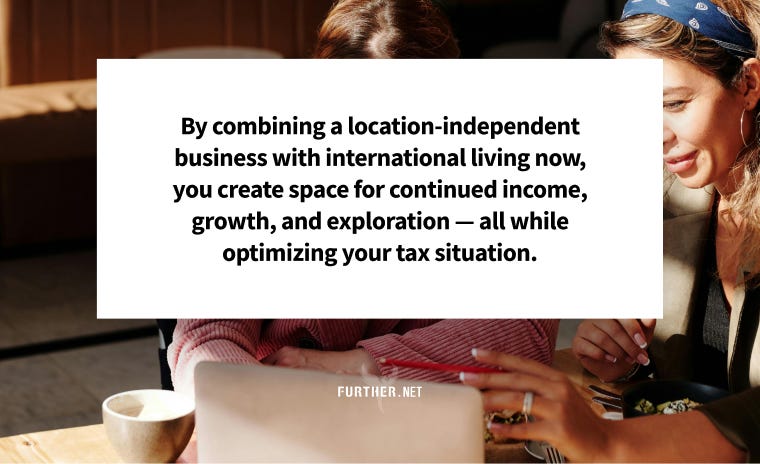How to Pay Zero Taxes on a Six-Figure Income as an American Expat
Plus: Lake Arenal in Costa Rica and getting to know Montenegro
Welcome to this week’s issue of Further, a newsletter for people in their 50s and 60s looking for a more satisfying alternative to the mythical “golden years” retirement.
If you’re here and haven’t yet subscribed, join 19,000+ people looking to live their best life at midlife by grabbing our free resource: The Further Guide to Unretirement Planning.
The new regime in the United States has more people wanting to leave more than ever.
And I’m betting that most of those folks would like to stop paying taxes to a government they no longer approve of and a country they no longer live in.
So you simply leave and no longer pay taxes, right?
Unfortunately, no. One major misconception among my fellow Americans is that they won’t have to pay taxes or even file a U.S. tax return once they leave the United States.
If you were a citizen of just about any other country in the world, you could get free from the tax system.
For example, if you’re Canadian and decide to relocate to a different country with much lower tax rates, you can opt out and just do it. The same applies to Australians and the British when leaving their home countries for greener pastures.
But the American government taxes your worldwide income whether you reside in the States or not. That’s right — good ol’ Uncle Sam wants you to keep paying taxes even if you leave the country and never set foot on American soil for the rest of your life.
There is, however, a way to shield a healthy chunk of income from U.S. taxes for money you make while physically working outside the United States. And that’s what having a location-independent business is all about.
The way to do this is through the Foreign Earned Income Exclusion (FEIE). You still have to file a tax return, which is how you claim the exclusion.
For 2025, you can exclude up to $130,000 of income per person from U.S. taxation; meaning if your spouse works with you in the business or they have their own, they too can exclude $130,000 for a grand total of $260,000 for the family.
What counts as foreign-earned income? Essentially, it's money you make while physically working outside the U.S., whether your clients or employers are American or not.
This includes:
Salary from a foreign employer
Freelance income earned while abroad
Business profits from your location-independent venture
Self-employment earnings generated outside the U.S.
What doesn't qualify? Passive income such as:
Interest
Dividends
Capital gains
Rental income, and
Retirement distributions.
To qualify for the FEIE, you'll need to pass one of two tests.
The Physical Presence Test requires spending at least 330 days in countries other than the U.S. for 12 months. This doesn't have to align with the calendar year, but the test is incredibly strict and must be complied with precisely.
The Bona Fide Residence Test mandates establishing legitimate residency in another country for a complete tax year, demonstrating that you've genuinely relocated rather than just extended your vacation. This provides more flexibility when returning to the States, allowing you more than 35 days in the country.
Some related tax credits benefit expats as well:
The Foreign Housing Exclusion allows you to further reduce taxable income by excluding qualifying housing expenses.
Meanwhile, the Foreign Tax Credit lets you offset U.S. tax obligations with taxes paid to foreign governments and can be especially valuable for income that doesn't qualify for the FEIE.
That last credit suggests that you’re paying income taxes to another country, right? So how does one pay zero in taxes up to the limit provided by the FEIE?
There are three routes:
Residing in a country with no income tax
Never becoming a tax resident of another country
Residing in a country that doesn’t tax income from outside the country
Those options require further exploration, as do the ins and outs of the FEIE itself. The rules of both the Physical Presence Test and the Bona Fide Residence Test are intricate and often counterintuitive, and a tiny mistake can cost you tens of thousands of dollars.
I’ll walk you through it all in our first Further Premium webinar: How to Pay Zero in Taxes on a Six-Figure Income as an American Expat coming in April.
This is just one of many webinars you’ll get exclusive access to as a Premium Member. That’s in addition to multiple courses on building your location-independent business and a whole lot more.
You can see an overview of what you’ll get as a Premium Member here. You’ll also benefit from a low introductory investment for the next couple of weeks.
Too many people wait for traditional retirement only to discover that purpose and meaning matter more than leisure.
By combining a location-independent business with international living now, you create space for continued income, growth, and exploration. The tax advantages make the math work even better.
Keep going-
P.S. New to Further? Join us here.
Costa Rica's Hidden Expat Gem
Finding the perfect balance of connectivity, lifestyle, and cost efficiency transforms not just where you work, but how effectively you operate. The Lake Arenal area in Costa Rica delivers this trifecta remarkably well, which is why it’s on our short list of investable areas.
Lake Arenal: Where Remote Work Meets Paradise in Costa Rica
Along the Adriatic Sea
Montenegro, a small Adriatic nation tucked between Croatia and Albania, presents an exciting opportunity for location-independent folks. Travel + Leisure recently highlighted it as one of “six up-and-coming retirement regions to watch in 2025,” but this overlooked European gem offers far more than just a retirement destination.
Why Montenegro Is More Than Just a Retirement Dream
Fall Into the Gap
While the impetus for a midlife gap year is similar to what it is for 18-year-ods, it’s not going to look the same. And before you decide you can’t afford to take a grown-up gap year, it’s worth considering the value of taking an extended break to check out new horizons. You may come out ahead in the long run.
The Case for Taking a Midlife Gap Year
further: flashback
🎶 David Bowie - I'm Afraid of Americans, Earthling, 1997 🎶
The video for I'm Afraid of Americans has David Bowie wandering the streets of a large U.S. city, witnessing simulated acts of gun violence (two years before Columbine ushered us into the next level). He's also being menacingly stalked... by Trent Reznor of Nine Inch Nails! Scary indeed. (YouTube)
further: sharing
Enjoy this issue? Please forward this email to friends or share by clicking below:
Thank you for sharing Further!




I appreciated the info on the foreign income exclusion and am hoping there will be more information shared to premium subscribers about offsetting or minimizing the tax bite for passive income for U.S. taxes when living abroad and how to avoid or minimize the taxes you might owe on passive income to a foreign country. Thanks!
I totally get not wanting to pay taxes to a country you no longer live in, but if you still consider yourself an American, how would that feel to not support your fellow Americans who don't have jobs that let them work abroad, and probably make less (and thus pay less taxes)? I'm not saying it's wrong (and nobody asked me anyhow!), but if an American company is still paying me and I still consider myself an American, I can't help but feel a little weird about not pay any taxes. After all, many of us rage against the one-percenters who connive their way out of paying their fair share. (I feel compelled to note that I am a registered Democrat and and consider myself a progressive.)